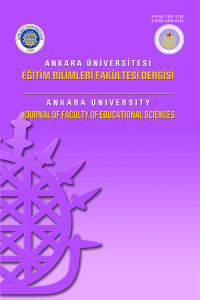Abstract
Academic achievement is expected from schools as a primary goal. However, the opportunities schools provide are no longer sufficient for students to achieve academic outcomes. Compared to the past, there is an increase in the problems students face because they are expected to study for many years on the way to academic achievement. At this point, evaluating structures such as social-emotional learning (SEL) in educational settings is crucial. Offering a set of skills, SEL makes it easier for students to cope with the problems experienced in educational settings. The way to academic achievement will be opened as a result of eliminating the factors that prevent academic achievement with the help of SEL skills. However, examining the relationship between SEL skills and academic achievement would be useful to evaluate the time and investment for SEL practices in schools. CASEL and OECD have put forward different models for SEL. However, the common point of these models is to equip students with knowledge and skills suitable for today's conditions. When schools are examined, it is seen that bullying behaviors increase and anxiety among students is widespread. It has been found that such problems negatively affect academic achievement. At this point, SEL is defined as the missing piece in schools. In which direction and how much this missing piece will complete academic achievement is crucial for the future of education. Thus, this review study examines the relationship between SEL and academic achievement.
References
- ........................................................................
Abstract
Akademik başarı, geçmişten günümüze kadar gelen ve okullardan beklenen temel bir hedeftir. Öğrencilerin akademik başarıya ulaşması adına okullar tarafından sağlanan olanaklar artık yeterli olmamaktadır. Eskiye nazaran vaktinin çoğunu okulda geçirmeye başlayan ve uzun yıllar okuması beklenen öğrencilerin akademik başarıya giden yolda karşılaştıkları sorun durumlarında artış olduğu görülmektedir. Bu noktada Sosyal-duygusal öğrenme (SDÖ) gibi yapıların eğitim ortamları açısından değerlendirilmesi büyük bir öneme sahiptir. Bir dizi beceri öne süren SDÖ, eğitim ortamlarında yaşanan sorunlarla öğrencilerin baş etmelerini kolaylaştırmaktadır. Akademik başarıyı engelleyen faktörlerin SDÖ becerileri sayesinde ortadan kaldırılması sonucunda akademik başarıya giden yol açılacaktır. Fakat okullarda gerçekleştirilen SDÖ uygulamalarına ayrılacak zaman ve yapılacak yatırımın değerlendirilmesi adına SDÖ becerilerinin akademik başarı ile ilişkisinin incelenmesi faydalı olacaktır. SDÖ için CASEL ve OECD tarafından farklı modeller ortaya konmuştur. Fakat bu modellerin ortak noktası öğrencileri günümüz koşullarına uygun bilgi ve beceriler ile donatmaktır. Okullara bakıldığında zorbalık davranışlarının arttığı ve öğrenciler arasında anksiyetenin yaygınlaştığı görülmektedir. Bu tarz sorunların akademik başarıyı olumsuz etkilediği bulunmuştur. Bu noktada SDÖ, okullardaki eksik parça olarak tanımlanmaktadır. Bu eksik parçanın akademik başarıyı hangi yönden ve ne kadar tamamlayacağı eğitimin geleceği açısından büyük bir öneme sahiptir. Bu sebeple bu derleme çalışması SDÖ ile akademik başarı arasındaki ilişkiyi incelemeyi amaçlamaktadır.
References
- ........................................................................
Details
| Primary Language | Turkish |
|---|---|
| Subjects | Other Fields of Education |
| Journal Section | Online First |
| Authors | |
| Early Pub Date | April 19, 2024 |
| Publication Date | |
| Published in Issue | Year 2024 |
 The content of the Journal of Faculty of Educational Sciences is licensed under Creative Commons Attribution-NonCommercial-NoDerivatives 4.0 International License
The content of the Journal of Faculty of Educational Sciences is licensed under Creative Commons Attribution-NonCommercial-NoDerivatives 4.0 International License


